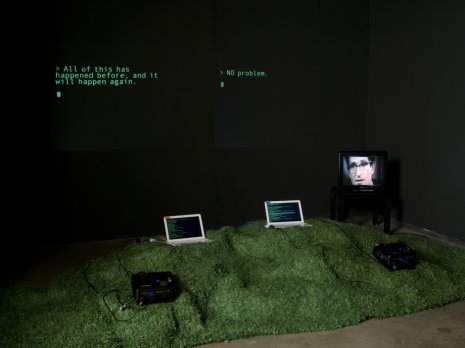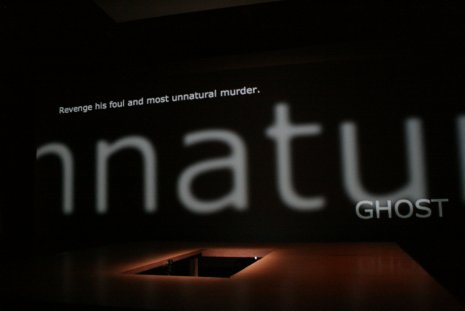Working with Computers
GL:
You describe some of your recent work as “algorithmic.” Can you explain what the word means to you? How did you first become interested in creating theater with computers?
AD:
An algorithm is simply a precise set of instructions. A lot of things can be called algorithms that have nothing to do with computers. A recipe, or directions to the airport, for example. But we mostly use the term to refer to the steps a computer takes in order to do things, make decisions, and turn a given input into an output. So when I talk about algorithmic theater, I mean theater that is made by computer algorithms, in collaboration with me and the artists I work with. It's procedural, it's rule-based. We've told the computer to do x and then to do y. But within that, the computer makes choice after choice. There may be dozens, hundreds or millions of ways to satisfy the instructions, so in a way the algorithm provides a structure and the content is filled in by the computer.
My discovery of this way to make theater was really a happy accident. In early 2009 I had an idea to work on the televised debate between Noam Chomsky and Michel Foucault. One of the big topics of their conversation is the relationship between language and creativity, whether there is such a thing as universal human nature or whether what we call human nature is a construction built from power relations, social forms, and so on. I was talking about the debate with a composer friend of mine and she mentioned Alan Turing's 1950 essay "Computing Machinery and Intelligence," a massively important text which opened up entirely new ways of thinking about artificial intelligence. Very briefly, Turing was trying to answer the question, "Can machines think?" His breakthrough was to suggest that if a machine can successfully convince a human that it is thinking, then it is. In other words, given that we really have no idea what thinking is or how it is done, we shouldn't try to produce the property of thought in a machine, but should rather try to achieve the effect of thinking, the illusion of thinking. It's inherently theatrical - it's about the audience's perception. And in response to this essay, computer scientists began developing programs, called chatbots, to generate language and converse with humans. So I had the thought that I could use chatbots to write and perform a dialogue about the same questions that Chomsky and Foucault were dealing with.
At first I didn't totally get all the consequences of this idea. As I got deeper into the research, I realized that there is something performative about how all algorithms function - and that most theater is already algorithmic. In traditional theater the actors and director and designers fulfill the instructions laid out in the text; in my theater, the team and I write an algorithm, and the computer fulfills it. It’s sharing responsibility for the creation of the event: we co-author, co-direct, co-design. I like that these two ways of knowing and of doing are combined - the human and the computational - as they are in our contemporary daily lives.
GL:
That makes sense. But it sometimes seems to me that the deeper subject of your work with computers is actually human-ness. By watching your computers unflaggingly follow instructions, tell jokes, play with language, "misunderstand" or "misremember" Shakespeare, you're also inviting us to reflect on our own sense of humor, failing memory, mortality…
Do you think that's fair? Or am I sentimentalizing the project?
AD:
I don't think you're sentimentalizing, but I do think there are different ways of looking at it. Naturally theatre is made for human audiences and the entire situation is organized for people, not machines. And the computers can sometimes feel pretty human - most often when they make mistakes. Even Alan Turing in that essay I mentioned above said that to really simulate thinking you have to program in some errors every once in a while. That already says something about our unreliable brains. But...maybe these pieces can also expose a kind of habitual narcissism, how, as a matter of course, we refer everything to ourselves, we anthropomorphize, we're like insecure teenagers constantly checking ourselves out in the mirror. I'm completely ok if audience members imagine that a human situation is being represented. Maybe the chatbots remind them of a bickering couple, or a senile relative. Or maybe the Ophelia scene in A Piece of Work feels psychologically "true." That's not wrong in any way. But I hope people also take the opportunity, at least for part of the time, NOT to see themselves, to deal with another mode, another way of ordering language and thought and information. It might even be a big relief to cede the central position, to encounter another kind of logic that isn't yours, that belongs to the algorithm.
GL:
I love the phrase "the computers can sometimes feel pretty human - most often when they make mistakes.” What does it mean for a computer to make a “mistake?” It’s presumably partly the element of chance, of your not being fully in control of the outcome, that makes some of this work so rich for you?
Can you talk a bit about the importance of chance, and not being in control, to you work?
AD:
Yeah, it's also a question, what is meant by a mistake. There can be bugs, of course, but that's not so interesting. Then there's the kind of mistake Turing was referring to: intentionally programmed inaccuracies that give the illusion of human error. Then there's another category, not really mistakes, but unexpected results. It's great when the computers produce something I didn't anticipate. They aren't going "off-script" - it's just that the number of possible paths through the script is so large that I could never predict them all. That's when you get nice surprises, and maybe feel the creative capacities of the system itself.
That speaks to the gap between the perceptible content on top and the code underneath. In computer programming people talk about elegant code the way mathematicians talk about elegant equations. It means the simplest program that can produce the best, the most desirable results. You try to limit the number of specific instructions for specific situations, if you see what I mean. Ideally, you'd have a short, very precise program, with no special cases, that would make possible a huge variety of interesting outcomes.
On one level I simply want, like Cage did, to be able to share the experience with the audience on a more equal footing. Getting away from the situation where I know everything about the piece already, and I present this already known experience to the audience. It’s much nicer when there's something we can discover together, when we can all be curious together. I like to challenge myself, my aesthetics - what do I like and why and can I rid myself of those judgments?
A lot of space for other kinds of thinking opens up when you stop trying to express something. All of a sudden everyone has a lot of independence and room to breathe. You know, in traditional narrative, theater people talk about the characters changing. I don't care much about fictional characters. I care about the audience and my colleagues, the people around the theater, in the city, everywhere. But I don't want to change them - how arrogant! I try to get away from the notion that there is something wrong with people, there is some lack or deficiency or something. Everyone is already excellent and complete and they don't need to change. Unless they want to. Maybe I want to change.
GL:
Ok, well you’ve set yourself up with this one: Maybe you want to change? How, and what?
AD:
Wow, I sure did. Next question!
But I suppose it's all the usual sorts of personal and political things: to be more generous in my life and work, and more courageous, to keep narrowing the gap between my words and my actions. And maybe to forget less often what I wrote above, about everyone being perfect already.
My next project is entirely on the subject of change and evolution using algorithms to effect real-time transformations of music, language, sound, bodies, space. It’s something I'm thinking about a lot at the moment.
""I hope people take the opportunity to deal with another way of ordering language and thought and information.""






